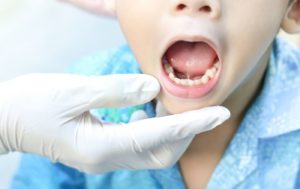Getting young children into the habit of flossing is just as important as encouraging them to brush their teeth. Learning to keep to a routine of flossing when young will stand them in good stead for the future.
Flossing daily removes plaque and particles of food that become embedded between the teeth and can result in gum disease, bad breath, and cavities. Brushing by itself won’t get rid of plaque and the harmful bacteria it contains.
You’ll have more success getting your youngster to floss if you started them off when they were an infant by doing it for them. You should begin to floss your child’s baby (primary) teeth as soon as the teeth fit together closely, generally when they’re aged two to six.
As they become more dexterous, typically around the age of ten, you can teach them how to floss for themselves. When you introduce your youngster to a new skill at an early age, they’re likely to continue the behavior in adulthood.
You could try tying small circles at the ends of a piece of floss to help them get a grip on it. Provide them with floss that’s flexible and soft so it’s comfortable for their teeth and gums
Then show them how to:
- Slide the floss between their teeth gently without snapping it down onto the gums.
- Arc the floss in a C form around each tooth, moving it up and down the sides of each tooth, into the gum line.
- Use a new length of floss for each tooth.
- Make Flossing Fun for Your Youngster
- Making flossing fun for your youngster will help them to get into the habit. For instance, you could play them one of their favorite songs to floss along to.
Let your child choose their flossing product: they will be more likely to use something they’ve picked out themselves. Take them shopping with you and help them to select a fun flosser they like the look of.
Flossing products also come in a range of flavors – cupcake, banana, and bubble gum, to name just a few – so make flossing more fun for your youngster by letting them pick one they especially like.
Floss together as a family. By flossing at the same time as your youngster, you’re setting a good example and demonstrating the right techniques. It will also be more fun and motivational for your child if you floss together.
Give your child a reward for flossing, such as a special bedtime story. An older child could be allowed to watch an episode of their favorite TV show before lights out. If they’re still reluctant to floss their teeth, explain that the longer they spend arguing about it, the less TV time they’ll get.
Draw up a chart, awarding your child a star every time they floss without being asked. Five stars and they get a prize. Make the treats more rewarding as the stars build up. If they have brothers or sisters, turn flossing into a fun competition by giving a slightly better prize to the first to get ten stars.
Explain the Importance of Flossing
Point out to your youngster the possible consequences of failing to floss. There are many child-friendly educational videos online that will help to convince youngsters of the benefits of flossing regularly. Here’s one of them, about the cavity monsters!
Use one of your child’s routine dental visits as an opportunity to ask the dentist to tell your child about the importance of flossing. Dental professionals like KidSmile Dental, who specializes in treating children, are experienced in explaining concepts like this to kids, and can probably do a better job than parents.
When Flossing is a Problem
Some children may have a sensitive mouth or overactive gag reflex, which can make flossing uncomfortable. To help minimize this problem, tell your child it’s OK to take breaks during flossing if they become upset or anxious. Letting them stop to take a few deep breaths can help lessen their stress levels.
If your youngster has autism or an attention disorder, they are likely to have issues that impact oral healthcare, including flossing. You can get advice from a pediatric dentist specializing in treating special needs patients.
Unfortunately, Children Do Get Gingivitis and Cavities
In May 2016, the online magazine U.S. News & World Report revealed that almost a third of people in the U.S. aged 30-plus never flossed their teeth. The research was carried out as part of the National Health and Nutrition Examination Survey (NHANES). The study also found that men were less likely to floss than women.
With so many adults neglecting to floss, it’s hardly surprising that kids don’t jump for joy about the chore. However, it’s essential to instill the flossing habit in your child to lay the foundation for a good routine of oral healthcare as they progress into adult life.
Flossing eliminates the colonies of bacteria that cause gum disease, a condition that, according to the Centers for Disease Control and Prevention (CDC), affects half the U.S. adult population, and can spread to other parts of the body, including vital organs such as the lungs and heart.
Gum infections start as gingivitis (inflammation of the gums), which can develop into the more serious issues of periodontitis (gum disease) and advanced periodontitis. Children rarely get periodontitis but, contrary to popular belief, gingivitis and tooth decay are common among children who still have baby teeth. According to the Centers for Disease Control and Prevention, tooth decay affects one in five youngsters aged five to eleven.
Check your child’s mouth regularly for signs of cavities and symptoms of gingivitis, such as swollen or bleeding gums, and bad breath. If in doubt, schedule a dental appointment for them.
While you’re focusing your efforts on getting your young child to floss, don’t forget about brushing! Failing to brush their teeth regularly can cause children discomfort and issues with speaking and eating well into the eruption of their adult teeth.





